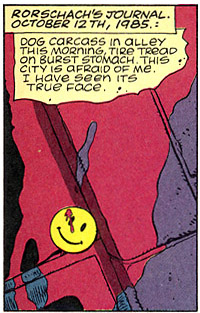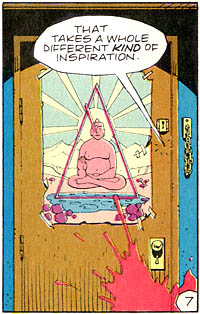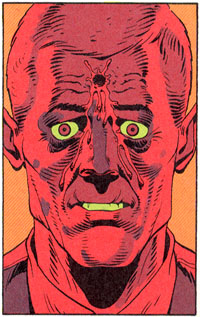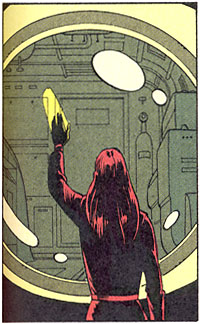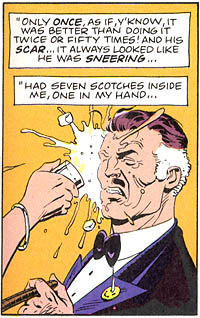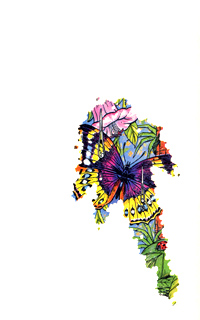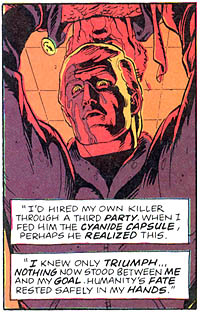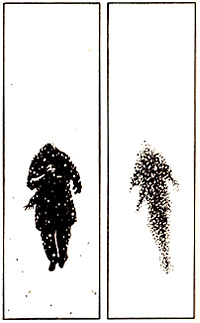
|
Five years ago I moved to New York and since I ate out a lot I started reviewing restaurants on my site. While each restaurant received a blurb, I also added a little quantitative information by using colored backgrounds: pink for awesome, purple for noteworthy, blue for acceptable, and gray for subpar. But some things are worse than just "subpar," so I added black; other things are better than just "awesome," so I added yellow. A color-blind reader complained, so I added numbers as well, and I decided that rather than go from zero to five I'd double the possibilities for every color but black and make it zero to ten. Since then I have gradually applied this scale to more and more things. It spread to the albums page first and then to the movies page. One point of confusion, however, is that I used to vote in the annual interactive fiction competition and post my scores, and those votes used a one-to-ten scale that was similar but not exactly the same. My current scale looks like this:
These ratings are holistic: I don't have a "system," but just apply the number that feels right. And they interact with each other in weird ways. I don't think I'd give any single Beatles album a rating higher than a Five, because when I listen to them I end up hitting the skip button a lot and listening to three songs. But for their career the Beatles probably get a Nine. Eight, minimum. On the flip side, cumulative consideration doesn't always work in the artist's favor. I would probably give Alan Moore's career a Six or a Seven, because so much of his work leaves me cold — even though he is the chief architect of one of the three works I would give this designation:
Now, by "perfection" I don't mean that the work couldn't be improved. What I mean is that my enjoyment of the work could not be improved — that even though there's a comma that needs to be fixed in one spot, for instance, fixing the comma wouldn't make a difference because I already like the work as much as I am capable of liking something.
Watchmen is a superhero comic book. Combined with my other two Tens, neither of which would be counted by most scholars as high art, this raises some questions. Am I, perhaps, semiliterate, and never learned how to read a real book with actual literary value? Well, maybe, but I have a bunch of diplomas that say otherwise. Of course, there are lots of academics who disdain high art as so much bourgeois wankery. When I was at Cal I briefly got involved with a zine called Bad Subjects, run by a bunch of grad students in the English Department who were doing their dissertations on stuff like Stephen King and Star Trek; I vividly remember an email by one of the co-founders which read, "I hate art films because they make me feel stupid, but when I go to a movie like Demolition Man I come out of the theater with my mind exploding with ideas about the sociological implications!" But I'm not really one of these. I like art that I can enjoy for itself, not prolefeed that I can only enjoy by expounding upon the way it hegemonically interpellates the masses into abetting their own oppression or whatever. I can't even agree with Matthew Amster-Burton when he says, "I would gladly debate the merits of the Associazione Vera Pizza Napoletana rules while eating a Supreme Personal Pan Pizza that has been sitting in the warmer for two hours." Anyone who has read my past articles about genre fiction — this one, for instance — can attest that where literature is concerned I'm almost as much of a snob as I am about pizza. So it's not that I'm unfamiliar with Joyce and Faulkner and Nabokov and García Márquez and such. Nor is it that I don't appreciate Joyce and Faulkner and Nabokov and García Márquez and such; I like them a lot (well, maybe not Joyce). Rather, I would contend that Watchmen is doing the same thing that their work does, and doing it better. It is the greatest work of literature I have ever encountered, and classifying it as a superhero comic book is like classifying Hamlet as a Scandinavian history lesson: accurate in a sense, but missing the point. I am obviously not going to attempt an exegesis of Watchmen here, though I once considered doing so for my dissertation — I figured maybe 1500 pages at half a page per panel. But I will say at least this much. Scott McCloud breaks creative works into two main categories, idea-driven and form-driven, and writes of an artist trying to choose between the two: "By choosing form, he'd be setting up to become an explorer. His goal: to discover all that the art form is capable of. And his art would not lack for ideas or for a purpose. His art would just become his purpose and the ideas would arrive in time to give it substance. [...] On the other hand, if he chooses the first step as his goal, then his art becomes a tool. And the powers of that art will rely on the powers of the ideas within. Now 'telling the story' (or in the case of non-fiction, 'delivering the message') takes priority over invention. But telling a story effectively as possible may require some invention. It often does." The reason Watchmen gets a Ten from me is that it is the work that has most wowed me on both counts. On the idea side, just a quick sampling: nothing I have ever encountered better captures my sense of how time and memory work than Dr. Manhattan's autobiography in the "Watchmaker" chapter. No one with the possible exception of Carl Sagan has made a case for the preciousness of life that I have found more eloquent and convincing than the conversation on Mars in "The Darkness of Mere Being." And what to say about Rorschach? In my writeup of Was, my favorite prose novel, I said that "Ryman keeps tossing in characters, and each one has more depth than most authors manage to achieve for any character they ever write. And somehow he manages to convey a sense of this depth in a matter of a few lines. Even the most incidental characters end up feeling more real than the protagonists of most stories. Hell, they feel more real than most people I know in real life." In Watchmen, Moore does the same, which is all the more impressive since these characters are Not Regular People.
But Watchmen is also a formal experiment. When I was at Cal I took a class on Shakespeare from Stephen Booth, who contended that the reason that Shakespeare's plays and sonnets were among the most highly regarded creations in human history was their internal resonance, the dense network of verbal and ideational rhymes within them. Booth is clearly more of a form guy than an idea guy. But again, Watchmen earns top marks on both counts; it is, as Dr. Manhattan says of time during the conversation on Mars, "an intricate structured jewel that humans insist on viewing one edge at a time, when the whole design is visible in every facet." Virtually every panel, drawn by Dave Gibbons to the ludicrously detailed specifications of Alan Moore, resonates with scores of others in half a dozen different ways, as packed with symbolism as a tarot card. Visual motifs recur in unexpected places and in unexpected ways; captions from parallel plot threads harmonize with on-panel action rather than merely describing it; one chapter, "Fearful Symmetry," is a sort of visual palindrome in both its page layouts and images, with a bunch of mirrors thrown in for good measure. I seriously have a hard time imagining the intellect that could keep a fix on a network of rhymes this dense. People call Watchmen a "graphic novel," but it's not a novel. It's an epic poem. The criticisms I have heard of Watchmen tend to miss this, as does a lot of the praise. All too often I have heard that Watchmen is notable chiefly as "the first realistic superhero comic," the first major project to suggest that you have to have some mental problems to dress up in a garish costume and beat up on crooks, to have a hero get shot to death after getting his cape caught in a door, to have another lose track of a villain because he had to take a bathroom break. This is true but it is incidental. The creators of the "grim and gritty" comics that followed in Watchmen's wake are like 1960s musicians who declared, "The Beatles have revolutionized popular music! We must copy their haircuts!" Others in the comics industry grumbled that they thought the "solution to the mystery" in Watchmen was hokey, as if the book actually were the detective story Rorschach believes it to be, as if Moore were spinning an adventure yarn fundamentally no different from West Coast Avengers. I cannot help but see these folks as real-life equivalents of Captain Metropolis and Mothman, thinking that Adrian Veidt is doing the same thing they're doing when he's operating on a level orders of magnitude above them. I'm sure the Society of Limerick Authors didn't care for the ending of The Waste Land, either. "'Shantih shantih shantih'? That doesn't even rhyme with 'Nantucket'!" Feeling as I do about Watchmen, I fell squarely into the target audience for Absolute Watchmen, an oversized, hardback volume with new coloring (true to the spirit of the original, but noticeably superior; the scans to the left are from my old, uncorrected 1992 copy since I didn't want to damage my new one) and a few extras at the end — script excerpts and so forth. It retails for $75. I got it on Amazon for under $50, because I could, but I would have paid $500 or more if that had been what it cost, and been glad to do so. Rereading Watchmen in this larger format was a sublime experience, and as always, I kept finding new details I hadn't noticed before. If I ever end up polluting my Ten rating with lesser works, I might have to bump Absolute Watchmen up to an Eleven.
Return to the Calendar page! |

